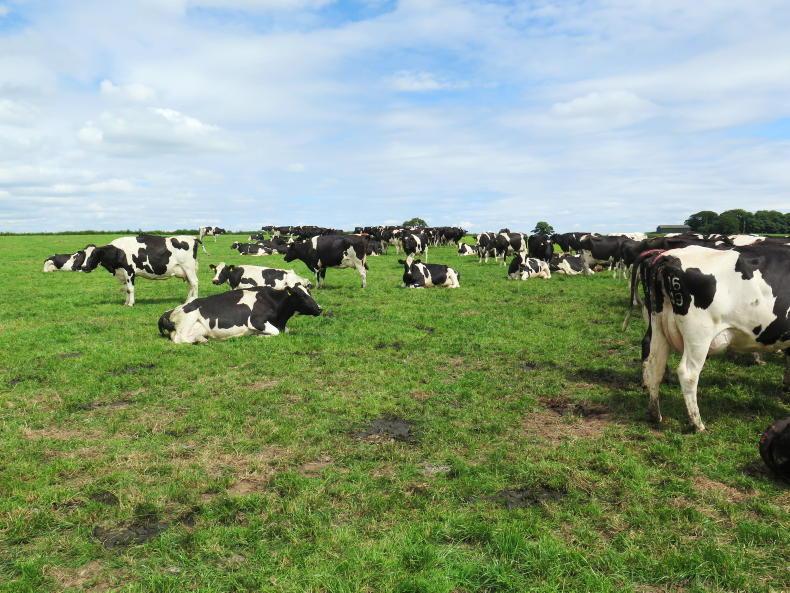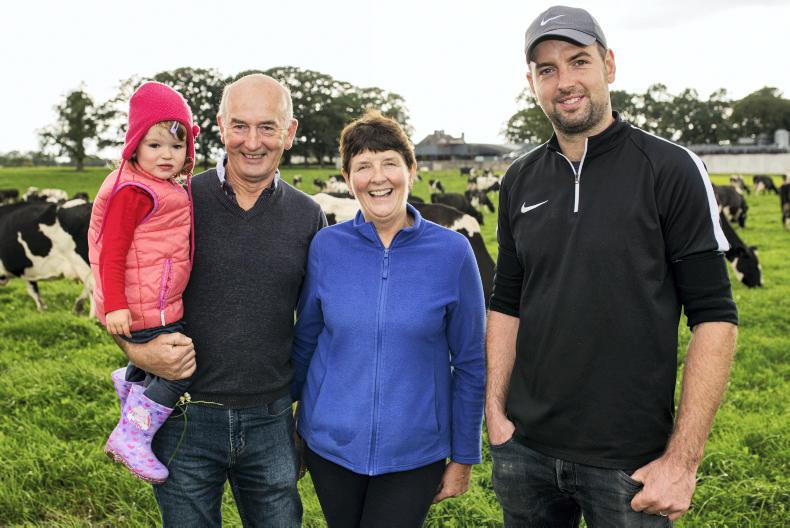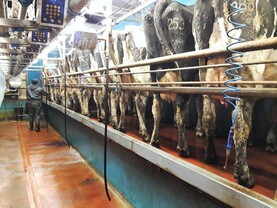Crowds of farmers flocked to the milk quality award winner’s farm walk in Limerick last week.
The McCarthy family from Feenagh won the award for excellence in milk production.
Michael, Mary Ita and Alex McCarthy are experts at producing quality milk, with the stats for last year at 4.20% butterfat, 3.59% protein, TBC of 4,000 and SCC of 108,000, and thermoduric averaging 127,000.
The 170-cow farm uses selective dry cow therapy on 80% of the cows, with any cow with an SCC of less than 175,000 being selected for teat sealer only this year.

The McCarthy herd of 170 cows have an EBI of €176.
Speaking at the farm walk, Don Crowley from Teagasc outlined how good practices can help to reduce SCC problems.
In the McCarthy case, they pre-dip and wipe each teat before milking and use a post-milking teat spray after milking.

The herd is all Holstein Friesian with a six-week calving rate of 86%.
Milk records are essential and Mary Ita is in charge of this area.
Using the information from milk recording, she can determine which cows get sealer only and which cows get sealer plus antibiotics.
Don Crowley says that milk recording will help farmers to identify the high-SCC cows which contribute most to the bulk tank SCC.
These cows can be treated or culled if they don’t improve. He said there is another option and that is to dry off the affected quarter if it doesn’t respond to antibiotics.
Best method
“The best way to do this is to not milk that quarter for three milkings and then milk it on the fourth milking. This will reduce the amount of milk being produced in that quarter but at the same time milking it on the fourth occasion will help to prevent swelling and soreness.
“I would recommend farmers to do this three times before drying off that quarter for good. So don’t milk for three milkings, then milk for one milking and repeat that three times,” Don says.

Chloe, Michael, Mary Ita and Alex McCarthy who hosted the farm walk last week.
With new rules coming in on antibiotic usage, he says it is likely that farmers will need to collect milk samples from quarters affected by mastitis and get this cultured by a vet lab before an antibiotic will be prescribed.
Crowds of farmers flocked to the milk quality award winner’s farm walk in Limerick last week.
The McCarthy family from Feenagh won the award for excellence in milk production.
Michael, Mary Ita and Alex McCarthy are experts at producing quality milk, with the stats for last year at 4.20% butterfat, 3.59% protein, TBC of 4,000 and SCC of 108,000, and thermoduric averaging 127,000.
The 170-cow farm uses selective dry cow therapy on 80% of the cows, with any cow with an SCC of less than 175,000 being selected for teat sealer only this year.

The McCarthy herd of 170 cows have an EBI of €176.
Speaking at the farm walk, Don Crowley from Teagasc outlined how good practices can help to reduce SCC problems.
In the McCarthy case, they pre-dip and wipe each teat before milking and use a post-milking teat spray after milking.

The herd is all Holstein Friesian with a six-week calving rate of 86%.
Milk records are essential and Mary Ita is in charge of this area.
Using the information from milk recording, she can determine which cows get sealer only and which cows get sealer plus antibiotics.
Don Crowley says that milk recording will help farmers to identify the high-SCC cows which contribute most to the bulk tank SCC.
These cows can be treated or culled if they don’t improve. He said there is another option and that is to dry off the affected quarter if it doesn’t respond to antibiotics.
Best method
“The best way to do this is to not milk that quarter for three milkings and then milk it on the fourth milking. This will reduce the amount of milk being produced in that quarter but at the same time milking it on the fourth occasion will help to prevent swelling and soreness.
“I would recommend farmers to do this three times before drying off that quarter for good. So don’t milk for three milkings, then milk for one milking and repeat that three times,” Don says.

Chloe, Michael, Mary Ita and Alex McCarthy who hosted the farm walk last week.
With new rules coming in on antibiotic usage, he says it is likely that farmers will need to collect milk samples from quarters affected by mastitis and get this cultured by a vet lab before an antibiotic will be prescribed.









 This is a subscriber-only article
This is a subscriber-only article











SHARING OPTIONS: